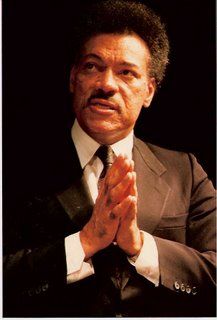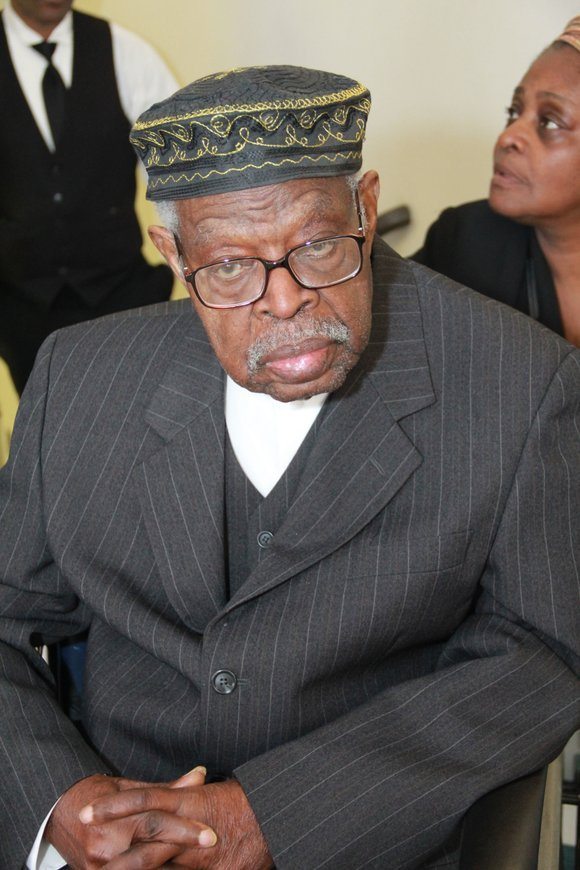When Eurocentric folks and their racist cousins in the U.S. were running riot with falsehood about the African continent, its civilisation and people, a few men of African stock rose to counter the false narrative.
Resorting to research and scholarship, scholars and historians such as Dr. Ivan Van Sertima, Dr. Chancellor Williams, Dr. John Henrik Clarke and Dr. Yosef Ben-Jochannan dispelled the misrepresentations being peddled by the Eurocentric scholars.
If today, musicians and their sporting cousins are the toast of people, the above mentioned scholars were the stars and celebrities of their time. They published books, appeared on TV and radio talk shows to debate the issues of race and of civilizations.
Dr. Sertima was born on January 26, 1935 in Georgetown, Guyana. He passed away on May 25, 2009 aged 74 in his sleep.

For over four decades, Sertima told Africa’s story ferociously. His passion stemming from injustices he experienced in the 1950s while Guyana was still a British colony. He will later note in an interview that his duty was to tell “the true story of the African, to recover the essence of his early civilisations so that the tragedy of slavery, of colonisation, of myths about his fundamental inferiority may be destroyed forever.”
Dr. Leonard Jeffries, professor at the City University of New York, commenting on Sertima’s death, hailed him as “one of the giants in terms of restoring the truth of Africa’s contribution to world civilisation. He documented, with science and history, African primacy.”
Dr. Sertima was the author and editor of several books and academic journals. His first publication was a Swahili Dictionary of Legal Terms which he completed in 1969 as part of an undergraduate field project for the University of London’s School of Oriental and African Studies (SOAS).
His most acclaimed work was ‘They Came Before Columbus: The African Presence in Ancient America,’ published in 1976. With fastidious scholarship and science, Dr. Sertima documented the planned presence of Africans in the Americas during the period of Ramses III (circa 1200 BC) and the 14th century–a period Sertima referred to as the “Man-dingo voyages.”
From 1957 to 1959, he served as a Press and Broadcasting Officer in the Guyana Information Services. During the decade of the 1960s, he broadcasted weekly from Britain to both Africa and the Caribbean. He began his teaching career in Africana Studies at Rutgers in 1972 and retired as Professor of Africana Studies in 2005. Dr. Sertima had a distinguished career as a literary critic, a linguist and an anthropologist and has made important contributions in all three fields.
The next scholar to look at is Chancellor Williams born on December 22, 1893. He was an African-American sociologist, historian and writer who came to national and international attention when he authored ‘The Destruction of Black Civilization’ book across 1971/1974.

Like Sertima, he had first-hand experience with the unjust system against Blacks in America as his father had been born into slavery and had grown up to gain freedom after the American Civil War.
The Bennettsville, South Carolina native seeing the poor state of people of his kind set out to have answers.
He notes: “I wanted to know how you explain this great difference. How is it that we were in such low circumstances as compared to the whites? And when they answered ‘slavery’ as the explanation, then I wanted to know where we came from.”
“… Raising more questions as I progressed through school, questions whose answers were even more perplexing. For, having read everything about the African race that I could get my hands on, I knew even before leaving high school that (1) The Land of theBlacks was not only the “cradle of civilization” itself but that the Blacks were once the leading people on earth ; (2) that Egypt once was not only all-black, but the very name “Egypt” was derived from the Blacks ; (3) and that the Blacks were the pioneers in the sciences, medicine, architecture, writing, and were the first builders in stone, etc . The big unanswered question, then, was what had happened? How was this highly advanced” ― Chancellor Williams, The Destruction of Black Civilization: Great Issues of a Race from 4500 B.C. to 2000 A.D.
Williams enrolled at Howard University, a historically black college. Over there, he earned an undergraduate degree in Education in 1930, followed by a Master’s in History in 1935. After completing a doctoral dissertation on the socioeconomic significance of the storefront church movement in the United States since 1920, he was awarded a Ph.D. in sociology by American University in 1949.
He joined the University of Oxford as a visiting professor between 1953 and 1954. In 1956, he did field research in African history at Ghana’s University College. At that time, his focus was on African achievements and the many self-ruling civilizations which had arisen and operated on the continent long before the coming of Europeans or East Asians. His last study, completed in 1964, involved field studies covering 26 nations in West, Central, East and Southern Africa, researching some 105 different societies and language groups. The results are an interpretation of Black History from the conquered as opposed to that of the conqueror. He assessed the factors that led to the downfall of a people who were once the “Cradle of Civilization.” He explains what happened, how it happened, and most importantly, what can be done about it.
Williams gathered material for his most notable book; The Destruction of Black Civilization: Great Issues of a Race Between 4500 B.C. and 2000 A.D., for 15 years only printing the time he did because he had started going blind. The book won an award from the Black Academy of Arts and Letters (BAAL).
Professor Williams published over 50 articles, professional books, and lectures. Among his publications are The Raven, The Rebirth of African Civilization and his greatest book, The Destruction of Black Civilization.
Williams died of respiratory failure on December 7, 1992, aged 98, at Providence Hospital in Washington, D.C. He had been a resident of the Washington Center for Aging Services for several years.
Another scholar worth mentioning is John Henrik Clarke, who was an American historian, professor, activist and a preeminent leader in the creation of Pan-Africanism and Africana studies in academic institutions in the U.S.

Clarke was born, “John Henry Clark,” on January 1, 1915, in Union Springs, Alabama. His father was a sharecropper and his mother, a washerwoman. At 17, Clarke took a freight train from his family home in Georgia to Harlem, New York to start his own life. He was among over six million African Americans who were moving from the rural south to the north in the Great Migration of the 1930s.
During the Black power movement in the 1960s, Clarke became a strong advocate for studies on the African-American experience and African history. He became a thought leader for his generation, joining the Harlem History Club where he met other Pan African pioneers, such as Kwame Nkrumah, Ghana’s first president. In fact, upon visiting Nkrumah in Ghana in 1962, he founded the National Council of Black studies.
Clarke eventually served as professor of Black and Puerto Rican Studies at Hunter College of the City University of New York from 1969 to 1986. He earned his PhD aged 73. He was also the founding chairman of the department. He also served as the Carter G. Woodson Distinguished Visiting Professor of African History at Cornell University’s Africana Studies and Research Center.
Proving that knowledge absorption happened not only through a rigid formal system, Clarke hunted for, analyzed and digested information from public libraries and second-hand bookstores.
He went on to found the African Heritage Studies Association and the Black Caucus of the African Studies Association in 1966. He eventually earned a doctorate from Pacific Western University in Los Angeles in 1994, after completing his bachelor’s there. Clarke has a number of honorary doctorates, among them a 1993 honorary doctorate from renowned historically black college, Clark Atlanta University.
Clarke has authored, contributed, and edited over 24 books. He also wrote more than 200 short stories, including ‘The Boy Who Painted Christ Black’.
His works continue to serve as research material for African-American and African historians. Clarke died on July 16, 1998 aged of 83.

To complete the list, we focus on Dr. Yosef Ben-Jochannan, who was also an Afrocentric historian whose work focused mainly on black presence in ancient Egypt. Dr. Ben reckoned through his writings that the pharaohs came out of the heart of Africa, adding the original Jews were black Africans from Ethiopia whose faith and customs were plagiarized by the white Jews.
Ben-Jochannan was born an only child to an Ethiopian father and an Afro-Puerto Rican Jewish mother in a Falasha community in Ethiopia. He attended schools in Brazil, Spain, Puerto Rico, and Cuba and earned degrees in engineering and anthropology. He continued his education at the University of Havana, Cuba, where he earned a Master’s degree in architectural engineering. He earned a doctoral degree in cultural anthropology from the same school, and finally, he attended the University of Barcelona, where he earned another doctoral degree, this time in Moorish history.
Ben-Jochannan moved to the United States in the early 1940s. He was appointed chairman of the African Studies Committee at UNESCO headquarters in 1945. He served in that position until 1970. Ben-Jochannan began teaching Egyptology at Malcolm King College in 1950, and then he taught at City College in New York. He was an adjunct professor at Cornell University from 1976 to 1987. He has also taught at Columbia University, Al-Azan University and Rutgers. He led an archaeological dig in the Nubia region of Egypt in the 1990s and also leads an annual trip of black people to Egypt. It should be noted, however, that some of Yosef’s academic certificates and supposed schools he enrolled in have been a source of debate.
Ben-Jochannan is a prolific author, penning 49 books, such as Black Man of the Nile and African Origins of Western Religions. The subject of most of his books is ancient Nile Valley civilizations. He also wrote and co-wrote elementary and secondary school texts in the 1960s. He is the chair of the publishing house Alkebu-Lan Foundation and its subsidiary, Alkebu-Lan Books and Education Materials Associates. He donated his personal library of more than 35,000 volumes to the Nation of Islam in 2002.
Dr. Yosef Ben-Jochannan died in Harlem, New York on March 19, 2015 aged 96.










